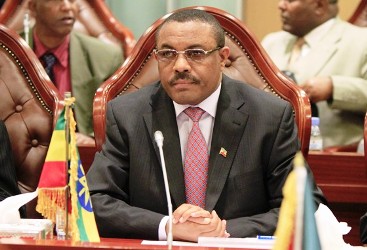UN Security Council delegation, Ethiopian premier hold talks
By Tesfa-Alem Tekle
October 9, 2013 (ADDIS ABABA) – A delegation from the UN Security Council on Wednesday concluded its visit to Africa’s Great Lakes region in Ethiopia where the group held talks with Ethiopian Prime Minister, Hailemariam Desalegn, who is the current chairperson of the African Union (AU).

During their discussion, Desalegn affirmed that Ethiopia and the African Union would continue to extend all the necessary support to the efforts by the United Nations to bring about peace and stability at the Great Lakes region and the rest of the continent.
Although Africa is striving to resolve its own problems by itself, it needs much more support from the international community, Desalegn said further lauding the contribution of the UN in this regard.
The Ethiopian prime minister underscored the significance of the joint discussions and decisions made between the UN Security Council and the AU Peace and Security Council to address the regional concern.
Official sources told Sudan Tribune that beyond the discussions on Africa’s Great Lakes, the UN delegation and AU officials have also conferred on the situations in Sudan, South Sudan, Central African Republic (CAR) and on ways of strengthening the weak Somalia government and on the battle against the al-Qaeda allied Al-Shabaab.
The main aim of the UN delegation’s visit was to discuss with the countries on the implementation of the Peace, Security and Cooperation Framework Agreement signed in February 2013 in Addis Ababa, Ethiopia.
Leaders of Uganda, Democratic Republic Congo, Rwanda, South Sudan, Mozambique, Tanzania and South Africa jointly signed the agreements with the UN Secretary General, Ban Ki-moon.
The agreement aims to stabilise the sub-region, including the eastern Democratic Republic of Congo.
The Security Council delegation has paid a visit to Democratic Republic of Congo, Rwanda, and Uganda before it wrapped its trip in Ethiopia.
In Rwanda, president Paul Kagame called on members of the United Nations Security Council to take a position on the International Criminal Court’s inappropriate use of international law.
“What we have seen is the selective use of international law for political purposes. International justice should not pursue one side while others remain above international law. We cannot run away from building justice systems locally. Ultimately, Africa should have its own court to try some of these cases” said Kagame.
African countries have increasingly accused the ICC of prosecuting only African leaders.
Many African leaders have called the ICC “anti-Africa’’ and “biased’’ while the AU branded it as “racist”.
After the ICC charged Kenya’s president and vice president for roles of the 2007 post-election violence, Nairobi in protest withdraw from the ICC, becoming the first country to withdraw from Rome Statute.
After withdrawing from ICC, Kenya called on other African countries to similarly follow in its foot steps.
The ICC, whose chief prosecutor is African, denies that it has an anti-African bias pointing out that it can only operate in countries that have signed up to the court unless the issue is referred by the UN Security Council, as was the case of the Darfur conflict in Sudan.
(ST)

